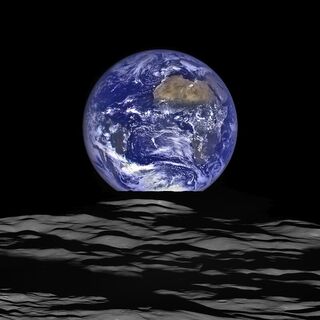Career
The Lunar Effect: The Psychology of Space Travel
Why does space travel bring about pyschological transformation?
Updated July 10, 2024

The ending of the US Space Shuttle program recently set me thinking about the psychological effects of space travel, as reported by astronauts. In the 60s and 70s - at the peak of space exploration - it was well known that many astronauts had profound transformational experiences in space. The author and researcher Frank White termed this the "overview effect."
Of the 24 US astronauts who traveled to the moon in the late 1960s and early 70s, it seems that the majority had powerful peak experiences during their trip and were permanently transformed as a result.
Charlie Duke, a member of the Apollo 16 mission in April 1972, looked out at his hatch at the lunar landscape and had a mystical vision of the presence of the divine. As he describes it, ‘I was overwhelmed by the certainty that what I was witnessing was part of the universality of God.' While walking on the moon and looking down at his fresh footprints in the lunar dust, he ‘just choked up. Tears came. It was the most deeply moving experience of my life.'
Edgar Mitchell was a member of the third successful mission to the moon in January 1971 and holds the joint record for the longest moon walk (9 hours and 17 minutes). While looking out at the earth from his spaceship, he felt an overpowering sense of euphoria and tranquility, and shifted into a different state of consciousness in which he perceived the meaning of the universe. Within two years of his trip to the moon, he left NASA, and set up his own research institute, the Institute of Noetic Sciences, which is still flourishing today.
Gene Cerman, who took part in two lunar missions - Apollo 10 and 16 - had a similar vision of meaning and purpose. Looking at the earth from space, he felt that ‘It was too beautiful to happen by accident...There has to be a creator of the universe who stands above the religions that we ourselves create.'
Rusty Schweickart didn't actually travel to the moon - he was a member of the Apollo 9 mission, in March 1969, which carried out tests to prepare for the moon landings later that year. But his vision of the Earth from space changed his life. One of the tests was a spacewalk around his lunar module, where he floated 160 miles above the earth. As he gazed below, he felt as though he lost his identity as an American astronaut, and felt ‘part of everyone and everything sweeping past me below.' And he felt a profound attachment to and appreciation for the planet Earth: ‘This tiny beautiful earth - the planet that keeps us alive, which gives us everything we have, the food we eat, the water we drink, the air we breathe, the beauty of nature. And everything is so perfectly balanced and organised so that we can live. This beautiful tiny planet spinning through space.'

This heightened state of awareness stayed with Rusty after his return to Earth, and led him to change his life. Whereas before he'd given little thought to anything beyond his career as an astronaut, his new sense of connection filled him with a need to help others. He started to do voluntary work, at a clinic for drug addicts, and as a telephone counsellor for troubled teenagers, and he also started to practise transcendental meditation.
Why does travelling into space have this effect? I would suggest that there are four possible reasons:
• After seeing the fragility of the earth in space, astronauts no longer take anything for granted. They are always aware of how lucky they are to be alive.
• The enormity of space gives them a wider sense of perspective, so that they aren't so affected by trivial worries.
• For the same reason, they have become less egocentric, less focused on their own desires and needs.
• Seeing the universe stretching endlessly around them gives them a sense of meaning and connection which has never left them, a sense of being part of a unity.
This is another reason why the retirement of the Space Shuttle Program is a matter of regret. But all is not lost. In fact, space travel will soon be accessible to members of the public. Richard Branson's Virgin Galactic company is planning to run twice daily space flights from its launch site in New Mexico, at a cost of around $200,000 per person. Several test flights have been successfully completed, and the service is expected to begin sometime over the next three years. Virgin Galactic aim to create 50,000 new astronauts over ten years, and to eventually offer trips to the moon. So the transformational power of space travel will soon be open to others besides trained astronauts. And if the price comes down, I'll probably see you up there some time.
Steve Taylor is the author of Waking From Sleep, described by Eckhart Tolle as ‘An important contribution to the global shift in consciousness.' His upcoming book - where ‘The Lunar Effect' is examined in more detail - is Out of the Darkness. His website is stevenmtaylor.com.


